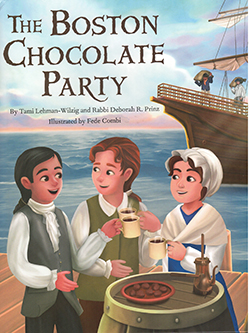The Boston Chocolate Party by Tami Lehman-Wilzig and Rabbi Deborah R. Prinz; illustrated by Fede Combi; Millburn, New Jersey: Behrman House Publishers © 2022; ISBN 9881681-155760; 30 pages including appendices; $17.95 on Amazon.

 SAN DIEGO — Many San Diego County residents fondly recall Rabbi Deborah Prinz, who formerly served as the spiritual leader of the Reform Temple Adat Shalom in Rancho Bernardo before she headed east to compile On the Chocolate Trail, a history and recipe book all about the development of chocolate.
SAN DIEGO — Many San Diego County residents fondly recall Rabbi Deborah Prinz, who formerly served as the spiritual leader of the Reform Temple Adat Shalom in Rancho Bernardo before she headed east to compile On the Chocolate Trail, a history and recipe book all about the development of chocolate.
Now Rabbi Prinz has utilized some of that knowledge in a collaboration with co-author Tami Lehman-Wilzig in a fictional story for 5-to-8-year-old children that conflates the introduction of hot chocolate to colonial America with the boycott of British tea that saw its most dramatic moments on December 16, 1773, when approximately 50 tax protesters dressed as indigenous Americans dumped 342 chests of tea into Boston Harbor.
Thursday, Dec. 16, 1773, also was the seventh night of Chanukah, a holiday that Mama and Papa Mendes celebrated with their son Joshua. As the Mendes family were Sephardic Jews, they utilized the Spanish spelling of the holiday: “Janucá.” Eating bunuelos (sweet fried dough) and drinking hot chocolate were their favorite treats for the holiday. Papa Mendes imported chocolate beans to America on the Esther, his sailing ship named for the biblical heroine. Their home had many reminders of their Jewish heritage: a portrait of the philosopher and religious commentator, Maimonides, over the fireplace; a hannukiah set in the window; and Jewish religious writings, including the Tanakh, on the bookshelves. Spices and a wine cup for havdalah were at a writing table.
In this story, Papa Mendes decides to have his assistant George take chocolate beans to Boston and show shopkeepers how to roast, shell, and ground them with sugar, forming them into balls preparatory to mixing them in hot water to make the hot chocolate drink. The merchants become enthusiastic about the product and so Papa and Joshua travel from their seaport city in Rhode Island to the capital of Massachusetts — a distance of 71 miles by today’s roads. Joshua has a reunion with his friend Isaac, with whom he plays jackstraws. Unfortunately, Isaac’s widowed mother is out of work, so the family is quite poor. Then Joshua hits upon an idea. An outdoor shed could be converted into a chocolate house. Lured by the sweet smell of chocolate, neighbors become the first customers.
Angry tax protesters pass Isaac’s home en route to Boston harbor on that Thursday, December 16th night. Papa says that the people of Boston have begun a fight for freedom. Joshua, clearly a very bright child, likens the moment to the resistance of the Maccabees to the Syrian-Greeks in the Januca story that the Mendes family has often retold.
The appendices include background material on Chanukah and the Boston Tea Party as well as recipes for buñuelos and colonial-style hot chocolate. There’s even a surprise piece of trivia, showing the kind of cups President George and Martha Washington used for drinking hot chocolate.
All in all, this is a book that combines years of research with the kind of imagination that will have children reading this book over and over. Co-author Lehman-Wilzig, who since 1977 has lived in Israel, was a finalist for the U.S. National Jewish Book Award with her story of Soosie: The Horse that Saved Shabbat.
*
Donald H. Harrison is editor emeritus of San Diego Jewish World. He may be contacted via donald.harrison@sdjewishworld.com